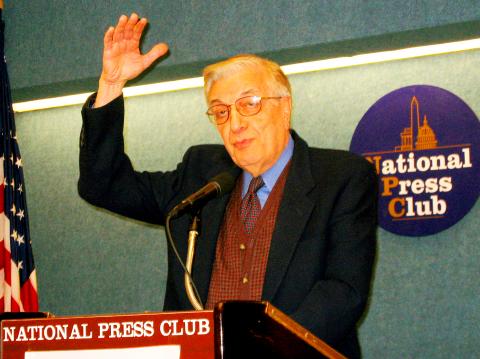Former American Institute in Taiwan (AIT) chairman Nat Bellocchi died on Monday at his home in Bethesda, Maryland, aged 88.
His family found him in his bed that morning after he apparently passed away peacefully in his sleep.
A frequent contributor to the Taipei Times’ opinion page, Bellocchi was head of the AIT from 1990 to 1995, a period of high tension and drama.

Photo: CNA
In May 1994, then-president Lee Teng-hui (李登輝) was infuriated when the US government would not allow him to leave the airport for a meeting with local Taiwanese community representatives during a stopover in Honolulu, Hawaii. The next year, the US Congress pressured then-US president Bill Clinton’s administration to allow Lee to visit his alma mater, Cornell University, in New York. Bellocchi was the highest-ranking US official to welcome Lee when he arrived at Cornell.
Soon after, Beijing used the visit as an excuse to fire missiles into the Taiwan Strait in the summer of 1995 and again in March 1996, at the time of Taiwan’s first democratic presidential election.
After retiring, Bellocchi closely monitored Taiwan-US relations and regularly wrote opinion pieces for the Taipei Times and its sister newspaper, the Chinese-language Liberty Times, detailing his observations.
Nat Bellocchi was also a special adviser to the Liberty Times Group.
“He [Bellocchi] argued for more international support for Taiwan and wanted the island brought into international organizations such as the United Nations,” Formosan Association for Public Affairs senior policy adviser Gerrit van der Wees said.
“Bellocchi urged the US to help bring Taiwan out of its international diplomatic isolation by enhancing ties with the new and vibrant democracy,” Van der Wees added.
Bellocchi enlisted in the US military when the Korean War broke out in 1950, serving as a first lieutenant in the rifle platoon of the 23rd Infantry.
He joined the US diplomatic service after completing his education at Georgetown University in 1955.
Bellocchi worked with the US’ diplomatic courier service in eastern and southern Europe, surviving a plane crash when the DC-3 he was flying in encountered engine trouble and had to be ditched in the Mediterranean Sea.
“Fortunately, Bellocchi and his diplomatic pouches survived the crash,” Van der Wees said.
Bellocchi served in Taiwan, Hong Kong, Laos and Vietnam, with the latter posting coming during the height of the Vietnam War.
He met his wife, Lilian, in Taiwan and the couple had two children, Luke and Jacqualine.
In the late 1970s and 1980s, Bellocchi served in Japan and India, and was later appointed US ambassador to Botswana.
He told friends that the AIT posting was “the most difficult and historic journey of my entire life.”
The Ministry of Foreign Affairs remembered Bellocchi for his contributions to bilateral relations over the past decades.
The Democratic Progressive Party also paid tribute to Bellocchi, with Chairwoman Tsai Ing-wen (蔡英文) saying: “Our hearts go out to Ambassador Bellocchi’s family in this time of sorrow.”
Additional reporting by CNA

A magnitude 7.0 earthquake struck off Yilan at 11:05pm yesterday, the Central Weather Administration (CWA) said. The epicenter was located at sea, about 32.3km east of Yilan County Hall, at a depth of 72.8km, CWA data showed There were no immediate reports of damage. The intensity of the quake, which gauges the actual effect of a seismic event, measured 4 in Yilan County area on Taiwan’s seven-tier intensity scale, the data showed. It measured 4 in other parts of eastern, northern and central Taiwan as well as Tainan, and 3 in Kaohsiung and Pingtung County, and 2 in Lienchiang and Penghu counties and 1

A car bomb killed a senior Russian general in southern Moscow yesterday morning, the latest high-profile army figure to be blown up in a blast that came just hours after Russian and Ukrainian delegates held separate talks in Miami on a plan to end the war. Kyiv has not commented on the incident, but Russian investigators said they were probing whether the blast was “linked” to “Ukrainian special forces.” The attack was similar to other assassinations of generals and pro-war figures that have either been claimed, or are widely believed to have been orchestrated, by Ukraine. Russian Lieutenant General Fanil Sarvarov, 56, head

FOREIGN INTERFERENCE: Beijing would likely intensify public opinion warfare in next year’s local elections to prevent Lai from getting re-elected, the ‘Yomiuri Shimbun’ said Internal documents from a Chinese artificial intelligence (AI) company indicated that China has been using the technology to intervene in foreign elections, including propaganda targeting Taiwan’s local elections next year and presidential elections in 2028, a Japanese newspaper reported yesterday. The Institute of National Security of Vanderbilt University obtained nearly 400 pages of documents from GoLaxy, a company with ties to the Chinese government, and found evidence that it had apparently deployed sophisticated, AI-driven propaganda campaigns in Hong Kong and Taiwan to shape public opinion, the Yomiuri Shimbun reported. GoLaxy provides insights, situation analysis and public opinion-shaping technology by conducting network surveillance

‘POLITICAL GAME’: DPP lawmakers said the motion would not meet the legislative threshold needed, and accused the KMT and the TPP of trivializing the Constitution The Legislative Yuan yesterday approved a motion to initiate impeachment proceedings against President William Lai (賴清德), saying he had undermined Taiwan’s constitutional order and democracy. The motion was approved 61-50 by lawmakers from the main opposition Chinese Nationalist Party (KMT) and the smaller Taiwan People’s Party (TPP), who together hold a legislative majority. Under the motion, a roll call vote for impeachment would be held on May 19 next year, after various hearings are held and Lai is given the chance to defend himself. The move came after Lai on Monday last week did not promulgate an amendment passed by the legislature that